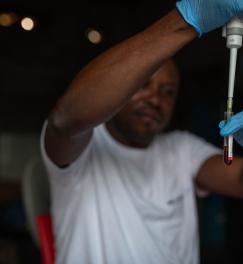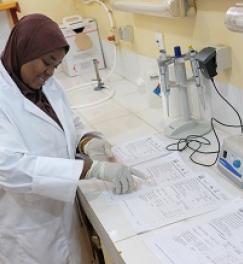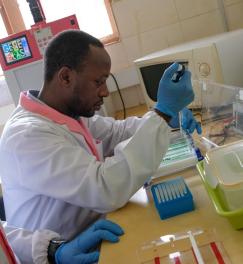our history
Thursday 19 August 2021 - Updated on Tuesday 2 January 2024
Since its creationin 1986, Epicentre has conducted field epidemiology activities, research projects and training sessions in support of MSF's goals of providing medical assistance in areas where people are suffering from conflict, epidemics, disasters or where access to care is inadequate or non-existent. Learn more about the progress that has already been made.
Epicentre in a few dates
- 1986: Creation of Epicentre on the initiative of MSF doctors trained in epidemiology in the United States.
- 1990: Study on pellagra, a disease caused by a lack of the vitamin B3. Recognition by the United Nations and modification of the composition of the food ration distributed to Mozambican refugees in Malawi
- 1991: Mortality survey in Iraqi Kurdistan
- 1994: Study on single-dose oily chloramphenicol as a treatment for meningitis in an epidemic situation; mortality survey among Rwandan refugees in Goma (DRC)
- 1997: Efficacy study of new cholera vaccines in Uganda
- 1998: Opening of the Research Center in Mbarara, Uganda, in the heart of the Mbarara University of Science and Technology (MUST) and the Mbarara Regional Referral Hospital (MRRH). The Center works closely with the Ministry of Health and other research, academic and health sector stakeholders.
- 2000: Creation of the monitoring software "Follow Up Care HIV Aids (FUCHIA) for the follow-up of patients in AIDS treatment programs
- 2001: Evaluation of rapid diagnostic tests for malaria
- 2003: Studies in Niger on the effectiveness of ambulatory strategies for the treatment of malnutrition
- 2004: Surveys in Darfur to document violence and excess mortality among the population
- 2005-2009: Creation of the Epicentre research center in Maradi, following the 2005 nutritional crisis in Niger. The center was officially registered in Niger in 2009.
- 2006: Study on the relevance of mass vaccination in the event of a measles epidemic
- 2008: Conclusive results of the NECT clinical trial that simplifies the treatment of sleeping sickness
- 2008: Decentralization of training sessions in the field
- 2010: Epidemiological support to MSF's relief interventions during the earthquake and cholera epidemic in Haiti
- 2012: Feasibility and effectiveness study of reactive vaccination during a cholera epidemic in the Republic of Guinea
- 2013: Signing of a collaboration agreement with Institut Pasteur for the development of field diagnostic tests for pediatric infectious diseases
- 2016: description of the epidemiological characteristics of the Cholera epidemic, including transmission factors during the epidemic, which took place in Yemen
- 2017 Demonstrating the efficacy of the Rotasiil vaccine - thermo-stable, easy to transport, and affordable - in preventing severe gastroenteritis in infants in Niger
- 2018 Monitoring the evolution of the Ebola epidemic in the DRC and the effectiveness of the response, formulating recommendations to guide decision-making that are then implemented by the follow-up unit and actions.
- 2020-2023: Development of a strategic plan with the objectives of increasing and diversifying expertise, consolidating positioning, particularly within MSF, and continuing to open up to other partners in order to further improve access to quality care for populations living in unstable situations
- 2020: First fully online training on epidemic response (RepEpi)
- 2020: Development of dashboards to describe the COVID19 epidemic and clinical forms in MSF intervention sites covering nearly 50 countries.
- 2020 Implementation of the Alert-CoVid-19 platform for COVID19 surveillance in Niger, which can be used for recurrent diseases such as measles and meningococcal meningitis
- 2021: Evidence that a partial dose of yellow fever vaccine is effective and could allow millions more people to be vaccinated in an emergency situation
- 2022: GCLP (Good Clinical Laboratory Practice) accreditation for the laboratory at the Mbarara Research Centre in Uganda
- 2022: Evaluation of vaccination coverage against COVID19 among people living in very precarious conditions in France
- 2023: Demonstration of the good performance of the FujiLAM test for the diagnosis of tuberculosis in people living with HIV
- 2023: Evidence that severe complications following unsafe abortions in fragile contexts or conflict zones can be up to seven times higher
Our on-going projects
Find out more
Research Center in Niger
Find out more
Research Center Uganda
Find out more





